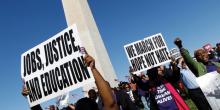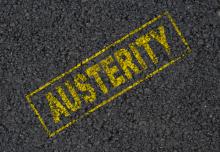austerity

Last week, Half in Ten released its third annual report on its commitment to and efforts toward U.S. poverty reduction. The Half in Ten Campaign is a joint project of the Center for American Progress Action Fund, the Coalition on Human Needs, and The Leadership Conference on Civil and Human rights, with a mission to build political and public will to cut the nation’s poverty rate in half in 10 years.
In her remarks, Neera Tanden, president of the Center for American Progress, stressed the need to move the conversation in Washington away from implementing austerity measures that ultimately harm the poor.
Scripture also reminds us over and over again to care for the least of those in society, including widows, orphans, and immigrants in our midst. We are called to be generous with what we have. Labor Secretary Thomas Perez echoed this truth at the Half in Ten meeting, urging that at this time, we need to “turn toward one another, not against one another.”

THE PHRASE “a revolution of rising expectations” is now part of the social science literature. When people who are not oppressed have a belief that life is getting better as economies improve, their expectations often outstrip the pace of actual change. Those rising expectations lead to unrest as demands for improvement continue to grow.
This summer we have seen that play out in several countries. As living standards increase, people are less likely to tolerate corrupt and inefficient governments. Washington Post reporters Anthony Faiola and Paula Moura recently wrote, “One small incident has ignited the fuse in societies that, linked by social media and years of improved living standards across the developing world, are now demanding more from their democracies and governments.”
In Turkey, it was the government’s plans to destroy the only public green space in the heart of Istanbul, a park that was to be replaced with a shopping mall. Protests against the plan soon grew into broader concerns about what is seen as increasingly authoritarian rule by Prime Minister Recep Tayyip Erdogan. They turned violent when peaceful demonstrators were attacked by police, and ultimately an Istanbul court ruled against the plan, although it is not finally settled.
In Brazil, protests that began over a proposed rise in bus fares brought hundreds of thousands of people into the streets. The protests soon escalated into opposition to the large amounts of money the government is investing in facilities for the 2014 World Cup and the 2016 Olympics, while neglecting basic health care and education. President Dilma Rousseff has promised political reforms and increased spending on public transportation and other social needs.

AS THE U.S. Congress and the president repeatedly battle over the debt ceiling and contemplate cuts to Social Security and Medicare, austerity has begun to sound like common sense: "Families tighten their belts during hard times, and so must government."
However, "common sense" in our media age is carefully manufactured, and its underlying analogy doesn't always hold up to scrutiny. "Living within our means," for most families, includes debt financing for housing, cars, and college. Families having a hard time paying their bills may indeed tighten their belts—but they seek more income first, and cut care for children and the sick last. In contrast, federal budget austerity arguments always focus on spending, ignoring the revenue crisis born of decades of tax cuts.
Christians have a more profound reason to question "austerity measures": They conflict with our faith in God's abundance. In parable after parable—the prodigal son, the unforgiving debtor, Lazarus and the rich man—Jesus challenges us to emulate God's generosity. It is the theme of that most eucharistic miracle, the loaves and fishes. How to live in the light of God's abundance is never an easy question, but we must be open to its logic in every area of human existence, including our personal lives, our economy, and our government.
There is, needless to say, a deep contrast between Christian notions of abundance, rooted in God's boundless creative gift, and the modern field of economics, which bases itself on the principle that commodities are scarce. Yet there are also resonances between abundance and modern macroeconomics (the study of whole economies) as it developed in the New Deal period and the first three decades after World War II—especially in the great postwar era of shared prosperity, which saw an explosive expansion of the middle class.
During that period, everyone gave to the national common good, and everyone received—not just through strongly redistributive taxation, but through shared, unprecedented economic growth. And it wasn't simply the "invisible hand" of the marketplace that guided growth: The market was fostered by government's investment in infrastructure and education.

All across the European continent (and yes, Britain too), proponents of austerity are losing the argument and facing the political consequences. It is a concept that brought many of them to power in the fallout of the debt crisis, has now become “a dirty word”, and one that the ‘resurgent’ European Left continues to disavow.
While we all know that “it’s the economy, stupid,” what effect do these one-issue elections have on the health of our world? What happens when we become so focused on the money in (or not in) our pockets, that other vital issues fall by the wayside?
In their attempts to prove the ‘austerians’ (very different people from the Austrians) wrong, have those who see stimulus of the economy as the path to prosperity inadvertently lost sight of what is really important to the societies that they govern? Is there a risk that economic growth becomes an end goal, rather than a means to something greater – true human prosperity and investment in human capital?
We're sorely missing the servant leadership of America's CEOs on matters of corporate taxation.
As Congress contemplates trillions in budget cuts that will worsen poverty and undermine the quality of life in America, consider these findings from a new report that I co-authored, "Massive CEO Rewards for Tax Dodging," by the Institute for Policy Studies.
Last year, the compensation of 25 CEOs at major profitable U.S. companies was larger than the entire amount their company paid in U.S. corporate taxes.
These 25 include the CEOs of Verizon, Boeing, Honeywell, General Electric, International Paper, Prudential, eBay, Bank of New York Mellon, Ford, Motorola, Qwest Communications, Dow Chemical, and Stanley Black and Decker.
At Europe Through the Back Door, our tour program just sold its 11,782nd seat for our 2011 season -- topping our best tour sales year ever (2007). Despite our antsy stock market and doom-and-gloom news stories, it seems that our economy is gaining some confidence. And yet, at the same time, our local symphony and arts center are in financial crisis.
As a way to celebrate, to give back to my beautiful hometown of Edmonds, and to spark a little conversation about why a society as affluent as the USA is cutting education, neglecting our environment, and defunding the arts while our wealthy class is doing better than ever, I've decided to make a donation of $1 million (in $100,000-a-year payments over the next decade) to our local symphony and arts center. This sum represents the money I've gained in the 10 years since the Bush tax cuts for the richest Americans (those of us earning over $250,000 a year) took effect.
In the face of state and federal budget cuts, many of us have been fasting and contemplating the question: "What would Jesus cut?" In light of tax day, however, we might equally contemplate: "What would Jesus tax?"
After all, a great deal of our budgetary stress is the result of declining revenue, thanks to the economic downturn and decades of tax cuts.
A new report that I co-authored, "Unnecessary Austerity," argues that before we make draconian budget cuts at the federal and state level, we should reverse huge tax cuts for the wealthy and tax dodging corporations.
The Jesus I know would be concerned about the extreme inequalities of wealth and power that have emerged in our communities. He would rail against principalities and powers that rig the tax rules so the privileged pay less.
He would lament the destruction of God's creation through excessive consumption and pollution. And, he would be alarmed about financial and commodity speculation driving up the cost of food and worsening hunger. (In today's world of high finance, someone would be hedging investments on how quickly Jesus could multiply loaves and fishes.)